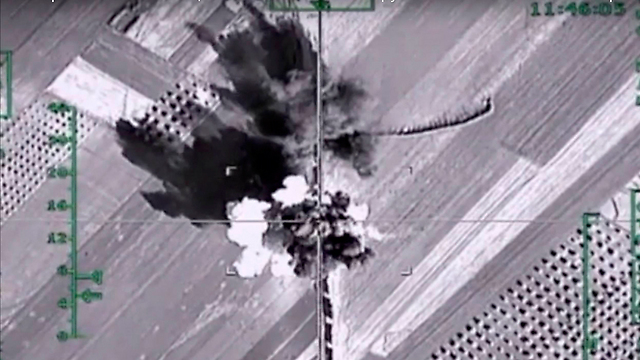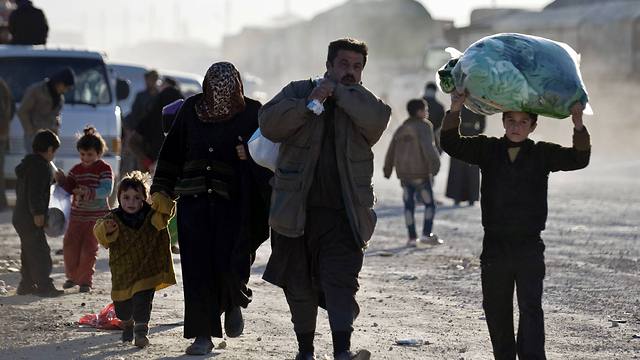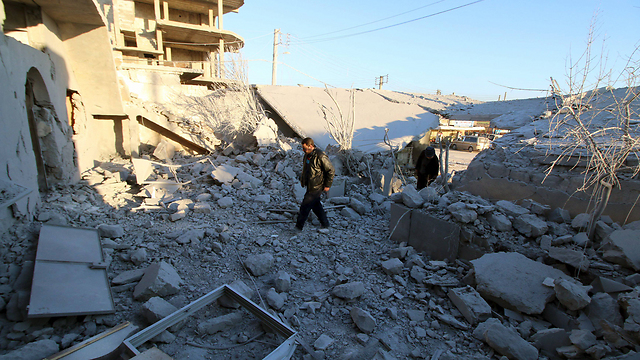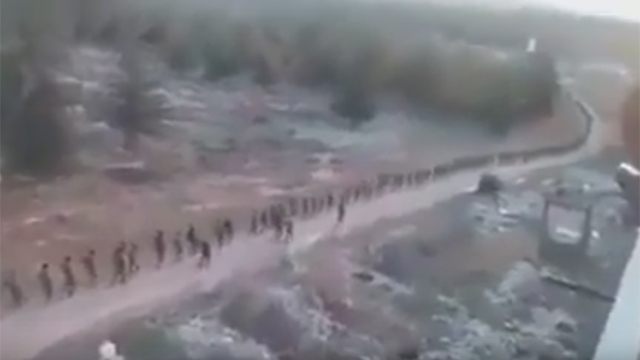Hell on earth: Surviving Aleppo
The Russian air blitz in Syria is expected to proceed beyond the new ceasefire, which doesn't apply to ISIS, anyway; residents of Syria's biggest city tell Ynet about life under siege, the will to survive, and the torture of waiting.
Russia and the United States recently announced a cease-fire in Syria, but ISIS and the other terrorist organizations are not included in the agreement and the Russian air blitz is expected to continue.
Meanwhile, the Syrians living in Aleppo - the country's largest city - are in a vise. They tell Ynet about their misery, blaming the Americans and telling of the scorched earth left behind by the Russians. "The Russian bombings only harm the civilians, and then we realize that Israel is a thousand times more compassionate," says one Syrian.
Last Wednesday, the Syrian regime managed, along with Hezbollah and its allies, to lift the three-and-a-half-year siege that the rebels imposed on the Shi'ite villages of Nubel and al-Zahra in the Aleppo area. Beyond the symbolic meaning of this victory, leading to further progress on the northern front, it also highlighted how the story of Aleppo has become the main story in the international media.
The regime achieved an important victory and the rebels lost. But the Syrians who live in the Aleppo area are the biggest losers of all.
One of them is Abd el-Kader Abu Yusuf, a resident of Aazaz, an important city located on the border with Turkey. "The lifting of the blockade severed the northern suburb of Aleppo from Aleppo itself," he tells Ynet. "The northern suburb became besieged from three sides. On the east, there is ISIS. In the south, we see the regime’s forces, and the west has the Kurdish militias."
This conversation reveals that what bothers him more than anything right now is precisely the progress of the "Syrian Forces of Democracy", a coalition of Kurdish forces whose, according to Abu Yousef, cooperation with the regime and the Russians tipped the scales in its favor.
"There were agreements between the Free Syrian Army and those Kurdish forces, but once they saw the regime was makin advances, they violated them. They took control of the villages in the northern suburbs of Aleppo and this week reached new heights with the takeover of Menagh Air Base. Present in these areas are not Islamist factions such as Ahrar al-Sham and the Nusra Front, but the Free Syrian Army".
Abu Yusuf does not mince words regarding the Obama administration's conduct: "I hold them responsible for the situation and tell them that the Kurds are really not a sure bet. In the end, they will sell out the United States and Israel. They serve the interests of Russia and the regime."
Asked whether Saudi-Turkish intervention would lead to a change in the war, Abu Yusuf expresses his skepticism: "Only Russia has proved itself up until now. Europe and the Arab countries have not proven themselves and to be honest, none of them can compete against the Russians."
Abu Yusuf notes that the Russians commit dozens of strikes daily in the area. "Russia is operating according to a method of indiscriminate destruction, as opposed to the Israelis and Americans who make an effort to strike precisely," he said. "If they want to take over a certain area, they turn it into scorched earth."
However, he says, the Russians are not bombing Aazaz itself, but rather its suburbs: "It looks like they're not bombing us because of international pressure – fear of a stream of refugees that will arrive inTurkey and from there to Europe."
He tellsYnet that "the Syrians hope that every country, even Israel, intervenes to liberate us from ISIS, the Kurds and the regime. We have no problem with anyone, just deliver us from the massacres and the daily attacks. Arab hatred for Israel is well-known, but in Syria people have begun to see how compassionate Israel is.
"When you see that in a war in Gaza, a hundred or two hundred civilians are killed, while in Syria, the Russians’ shelling is hitting only civilians, then you understand that Israel is a thousand times more compassionate. A lot of people here said they hope that Israel will intervene and occupy our lands – just don't let the Russians and the government come. They said it out of fear. Imagine six planes hovering over you and carrying out 100 attacks a day. This is a very scary thing. "
Abu Yusuf explains why he and many of his relatives and friends stayed in the area, as opposed to the tens of thousands who fled to the Turkish border. "At Aazaz there are about 100,000 people. If we leave, then the Kurds will take over the town and we will not return here anymore. In more than 25 villages that the Syrian Forces of Democracy have taken, the civilians in those villages were expelled and unable to return. Currently we are not ready to leave. They consider Aazaz as part of a future Kurdish state. It cannot happen."
But he knows that developments in the field can shuffle the deck at any moment. "Yesterday, the Kurds took control of the airport and the nearby village," he explains. "They are not far from us. You have to understand that this city is full of people. They are moving under cover of the Russian planes’ bombing. If it reaches the situation where they have the opportunity to conquer Aazaz, then the Russian Air Force will prepare the way for them and that will lead to many massacres and the expulsion of more than 100,000 people. "
What would you do in this situation?
"If it reaches point that they are taking overAazaz, I'll go out there with my family. I'm definitely afraid of what is going to happen to us. The Kurdish forces have no respect for women and children. If they come here, they will take the children and women and search them. They degrade women and the men in front of their wives."
The Syrian Forces of Democracy are associated with Kurdish forces that operate in northwest Syria near the Turkish border in order to establish independent governance.
Meanwhile, the humanitarian situation just keeps getting worse.
"Currently there are around 50,000 displaced persons on Turkish border who are staying in tents," says Abu Yusuf. "Some have not really found a place where they can settle. They sleep in the open air or in cargo trucks, and there are people who sleep in mosques or public squares. Even the lack of food is very noticeable. The situation is tragic. Even the humanitarian organizations have stopped working because of the situation. The entire northern suburb is besieged."
For the Syrian residents of the city, it seems, there is no simple choice between two bad options - ISIS and the Syrian regime - but it appears that the Kurdish forces anger them most of all: "All the people here say it would be less terrible if ISIS arrived."
In search of weapons, not food
This is what is happening in the northern suburb of Aleppo, but what's going on in the city of Aleppo itself? A Syrian journalist who constantly moves between Turkey and Aleppo summed it up: "In the center of Aleppo, attacks on markets and population centers have escalated, especially the Russians’ attacks. This is what makes people run away."
According to the journalist, "the humanitarian situation in Aleppo is very bad. Hospitals in the city center can only handle civilians, fighters have to go to hospitals in northern Aleppo. There is a great shortage of medical equipment and a shortage of doctors. There is also a problem with food and people mostly eat meat because the price of vegetables has sharply risen. Even the diesel price jumped."
The Syrian journalist tried to explain what is meant by "besieged Aleppo", a term frequently bandied about the media lately: "The city is under siege by the Syrian regime and by ISIS at same time. The regime did not control all of Aleppo, but only half of it. The second half is totally controlled by ISIS. It is different from the siege we see in other places." He, like Abu Yusuf, does not rule out the possibility of the relatively moderate rebels starting to cooperate with ISIS, which they prefer over the Syrian regime. "It's a possibility," they said.
Abu Tin al-Halabi, a photographer and an insurgent operative, said, "we do not want food and drink; we want anti-aircraft weapons." More than 500 people have been killed in Aleppo since the Russian airstrikes began on Syria's largest cit, and tens of thousands have fled, but there are those who have not yet surrendered. Bader Taleb, a 24-year-old rebel from Aleppo, laughed about the possibility of leaving Aleppo. "If something is important to you, then you don’t leave it . We want to topple Assad and I think we can do it."















